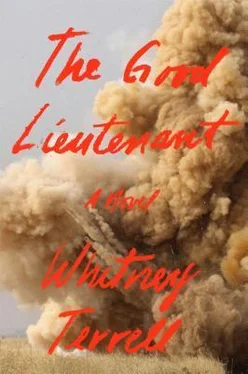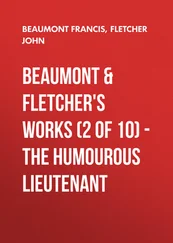Whitney Terrell
The Good Lieutenant
TO GAYLE, MOSS, AND MILES — YOU’VE ALWAYS BEEN THERE FROM START TO FINISH. ALL MY LOVE.
AND
TO W.F.
The target’s house was surprisingly palatial: three stories, winged and modular, its tan concrete balconies adorned with geometric, beveled corners, so that the whole seemed to have been cast from a mold. A stone wall circled it, covered with a matching taupe coat of mortar worked into a pattern of diamonds and grooved lines. Even after Lieutenant Emma Fowler directed her Humvee through the front gate, she still believed that she had not decided unequivocally to let Captain Masterson off the hook for all the illegal crap he’d pulled to find this place. Especially since that crap might well have been the reason her platoon sergeant, Carl Beale, was dead. She had merely come to scope the situation out. Make sure she was not endangering Lieutenant Pulowski or her platoon unnecessarily. Make sure that she could live with allowing Masterson’s whole bullshit-o-rama to stay intact. She’d expected this to be difficult but, somehow, during the hour it had taken them to convoy here from Camp Tolerance — the target’s house was deep in the Iraqi backcountry, west of Baghdad — the mere fact of driving in her own Humvee with Pulowski had made her feel as if, for the first time in months, they were together, and their old selves had come back. Inside the compound, she counted her soldiers as they chest-bumped the scorching summer air, feeling more than just relief. Yes, the war was fucked up. Yes, left and right you could see examples of people completely botching things in the worst way. Of people who refused to step up. But Pulowski and Crawford, Dykstra and Waldorf, the rest of the platoon — they had not fucked it up. They had not quit. They had not bitched and whined. They had acted in good faith.
She felt as if she had needed only that one gesture of good faith. Seeing Pulowski touch the broken shackle Beale had welded to his Humvee on the ride out, listening to him speak a memory of the sergeant, even after they’d gone all Survivor on each other over the past three weeks— especially after she’d cornered Pulowski in her trailer and, like some camera-hog New Jersey housewife, decided it would be helpful if she said the worst possible things to his face — as Jimenez might’ve put it, the moment had some serious bueno to it, the kind you didn’t feel every day. Better than tribal council, anyway.
* * *
As for the recovery of Beale’s body, after all this effort, it appeared completely matter-of-fact. She talked to Masterson about it at a broken picnic table in the rear of the compound. “Faisal says the body’s in the field out back,” he said. “We’ll just search it in sections, like we’re looking for a weapons cache.” He fanned his fingers on an aerial photo he’d pinned down with his pliers. “We form a straight line, walk it through. Take a couple hours, maybe. Faisal says he used to play here when he was a kid. There’s a well or something out there. Claims it’s hard to find, but I doubt it.”
The field was beyond the compound wall. Inside were nonincriminating beds of rosebushes, a toolshed, a half-swept terrace. The broken poles and stays of … a badminton net? She’d worried how badly Masterson might’ve hurt his interpreter to get this intel. Now she worried he hadn’t hurt him enough. “You find the owner?”
“Nobody’s here,” Masterson said. “But this patrol’s rotation began at three a.m. So, Lieutenant, I know this particular mission is important to you. I know you are eager to have this happen. I know you’ve been waiting a long time…”
“But you’ve got some tired men.”
“To say the least.”
“So what do you want from me?”
“I got a dozen guys here,” Masterson said. “We add your platoon, we can sweep this field in an hour.” He pointed to a road on the map, a black worm at the end of the field’s shaded gray. “Then we’ll have the Bradleys pick us up and take us home.”
“That’s on the opposite side of the field,” Fowler said.
“That’s right.”
She understood what he was asking then. With the twelve men he’d brought, Masterson would have to go down one side of the field and then come back up the other in order to cover the entire area. But if Fowler added her guys to the mix, they might sweep it in a single pass. “ I can go,” she said. “But I’ve got those cameras we talked about with me. Plus a signal officer.” She avoided Pulowski’s name, bending her tone to suggest that this being was far beneath Masterson’s attention. “You don’t want him out there. And if he stays, I need my team in here for security.”
“Who is this guy, somebody’s brother?” Masterson was fitting his body armor back on. When Fowler didn’t respond, he sighed. “All right, have it your way, Lieutenant. We do these cache searches every day. We got to stay out an extra couple hours, so be it. Why don’t you have your signal guy put a camera up while we’re working, at least?”
* * *
Harris was her real brother’s name. She thought about him as she and Pulowski crow-hopped the tubs of camera gear into the target’s empty house. Harris in his yellow tie and moleskin coat, his lower lip poked out, concentrating, the last time they’d met before she deployed, at an actual skating rink with actual pastel skaters painted on the boards, a memory no more or less incongruous than the hocus-pocus things that Harris had actually said. Let somebody else worry about what’s supposed to be true. That way you can figure out what you really believe. Now, with Pulowski above her, sweating and sharp-edged as usual, wiping his beaked nose, as they heaved the last tub up a ladder to the roof, she would’ve said that it had never been about what she believed. She’d only wanted to believe with someone else. That was the bueno in the Humvee, and that was what it felt like now, as she and Pulowski scuttled together to the roof’s edge, his face smeared with two days’ growth of beard but open to her again. Seeing her. Like the last piece to a puzzle she’d been struggling her whole life to complete. From there, they could see the toylike, humped bridge that marked the midpoint of Route Valentine, the distant railroad tracks, the tawny, rough edges of the canals, their silent banks of reeds. The field behind the house appeared to be several acres square, roughly the size of a section back in Kansas. The palm forest loomed on either side, and a mix of darker, orange-tinted wheat stalks and the paper-white clumps of plain grass ran away from them, slightly downhill, in a rolling series of bumps. Beale was there. This did not make the field feel ominous. Not in the way that an empty alley in Muthanna might. She heard the hard, dry hum of grasshoppers, the almost comic — given the usual tension of their patrols — desolation of the place. But she felt the strange, giddy lightness you sometimes got when you pulled off the interstate after a long drive, piled out of the car, and squatted behind a tree to pee: amazement at the stillness going on here, the stubborn persistence of life, always continuing, away from the rush of things. “Man, it was like some kind of ghost town coming in here. You wanna talk depopulation”—Pulowski snapped a picture of the field—“it’s like the Iraqi version of Kansas. Maybe we should just evac whoever’s left to Salina, give them a chicken farm, and call it good. Holy shit, what’s this?”
Pulowski wandered over to a weirdly shaped object in the center of the flat roof. His neck was so skinny up above his collar that his helmet resembled a tapered mushroom cap, and his white hips flashed between his belt and body armor. “You clear that?” she asked one of Masterson’s men as Pulowski poked his head inside.
Читать дальше












